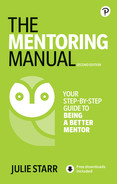Resources
![]()
Resources
The following resources are available as free downloads from the LearnStarr area of my website www.starrcoaching.co.uk. This content is free to use as part of your personal practice and I request that you do not charge others for it.
Resource 1: Agenda options for session two
What follows are two options for how you might structure your second session with a mentee, one with a clearer emphasis on building the relationship and the other with more of an action focus.
Agenda A – Relationship emphasis
| Ref. | Item | Approx. timing | Guidance |
| 1.0 | Build the mentor’s understanding of the mentee
The mentor ‘interviews’ the mentee to learn more of their background, current situation and preferences. For example: •‘So tell me more about how you come to be in this role and situation?’ •‘I’m interested to understand more about the work you do now. What are the challenges in that?’ •Understand their aspirations; ‘Can you describe what you want for the future, e.g. in your career or for your personal life?’ | 20 min. | Rather than follow my topics and questions exactly, be willing to stay with what comes up and what you are genuinely interested in. That could be anything from their choice of career to their choice of recreation or favourite pastime. |
| 2.0 | Build the mentee’s understanding of the mentor
•The mentee ‘interviews’ the mentor to learn more of their background, current situation and preferences. The mentee can use the previous agenda topics or simply interview the mentor according to their real interests and preferences. | 20 min. | As mentor, this is an opportunity for you to display openness and trust, e.g. in the amount of disclosure you are comfortable with. Balance this with a need to be appropriate/stay relevant. |
| 3.0 | Discuss and agree relationship principles
Use the following to confirm or agree how you will work together: •Responsibility for learning rests with the mentee, as the mentor stays ‘committed and unattached’. •Mentoring is a collaboration between mentor, mentee and ‘everyday life’, so there is a need to stay focused on outcomes while being adaptable to change. •What the mentee chooses to do, learn, or ignore from the mentoring conversations is not the mentor’s business. This is not ‘managing’ but mentoring. | 10 min. | Keep the tone of these light, e.g. ‘This might or might not crop up’ or ‘For me what that means is simply . . . ’ |
| 4.0 | Create conversation on a key theme or topic
Take one of the mentee’s development themes and discuss that, for example: •What interests you around this topic? •What objectives or goals do you have? •Share your (the mentor’s) thoughts and experiences that may be relevant, and perhaps consider where other assistance might be appropriate. | 30 min. | Check out ‘Hints and tips: in conversation with your mentee 1 and 2’ in Chapter 5. |
| 5.0 | Mentee summarises and creates a sense of the way forward
The mentee gives an overview of where they are following the conversation and how they want to take things forward, for example: •‘Here’s what I think I’ve got from this.’ •‘Here’s what I think I need to focus on or get done’ Commit to actions if appropriate. •Here’s what might stop me, and here’s how I intend to tackle that. | 10 min. | As mentor you can naturally add to the summary and remember:
•they need to engage with, and be empowered by, this process •what they do as a result of the conversation is something you must stay objective about •you are their mentor – not their manager. |
Agenda B – Goal and task emphasis
Resource 2: Examples of how you might mentor others
Here are three different scenarios in which you might mentor others.
Resource 3: Review an assignment: potential agenda topics and questions
The following questions create a clear focus on key topics for the review of an on-going assignment.
| No. | Topic and questions |
| 1. | The function of the meetings
•What works well about the way we’re collaborating? Frequency, duration, and location of meetings, etc. •What works less well? •What would work better? |
| 2. | Approach to the assignment
•How appropriate is the level of structure we’re using, agreements, expectations, identification of themes and objectives, etc. •What might we do less of? formal agendas, meetings in person, etc. •What could we add that would help? emailing notes, phone calls, etc. |
| 3. | Progress, results and outcomes
•What have been the main results of mentoring support for you so far? For example: •What has happened that has been directly affected/influenced by the mentoring? •What has happened that would not have happened, namely without the mentoring? •What else seems relevant? •Considering what you hoped to get from mentoring, how successful/effective is it? •What hasn’t the mentoring addressed that you feel is still a development need or barrier to your progress? |
Resource 4: Consolidate learning: potential agenda topics and questions
In the closing/completion stage of an assignment, the following questions focus on key topics within an effective review.
